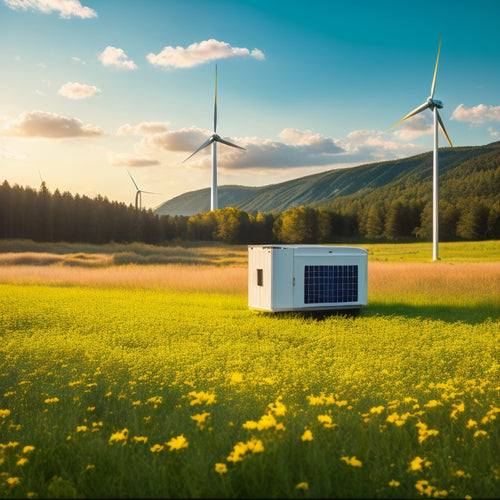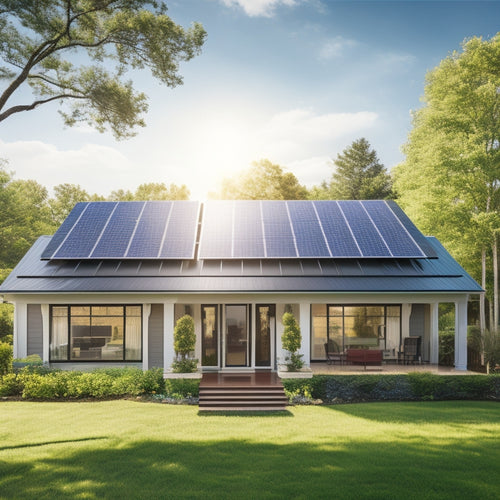
Purchase Solar Panels
Share
By purchasing solar panels, you're taking the first step towards achieving energy independence, reducing your reliance on the grid, and greatly cutting your utility bills. With solar panels, you'll generate clean energy on-site, reduce your carbon footprint, and enjoy backup power during outages. You can save hundreds to thousands of dollars annually on utility bills, and even potentially increase your property value. To maximize your energy savings, consider factors like roof orientation, panel efficiency, and material quality. As you investigate solar panel options, you'll uncover more ways to optimize your investment and create a sustainable, self-sufficient lifestyle.
The Essentials
- Achieve energy independence and reduce energy bills with solar panels, generating clean energy on-site and minimizing carbon footprint.
- Consider high-efficiency solar panels with maximum power generation capacity to optimize energy production and investment.
- Assess your roof's orientation and characteristics to determine the best solar panel placement, ensuring maximum energy generation and savings.
- Invest in durable solar panels with high-quality materials to ensure consistent energy generation over decades and reduce environmental impact.
- Take advantage of tax credits and rebates to enhance the financial benefits of solar installation and maximize your return on investment.
Zero Energy Dependency
You'll achieve energy independence now by installing solar panels, freeing yourself from reliance on the grid.
With a renewable power source, you'll generate clean energy on-site, reducing your carbon footprint and energy bills.
By utilizing the sun's energy, you'll enjoy a sustainable, self-sufficient lifestyle.
Additionally, with off-grid solar panel kits, you can overcome traditional solar panel system challenges, such as inconsistent energy supply and high upfront costs, and transition to renewable energy without extensive technical know-how.
Energy Independence Now
A rooftop array of solar panels can be the first step towards energy independence, liberating you from the grid's unpredictable rates and environmental impact.
You'll no longer be held hostage by electricity bills that seem to rise with each passing year. With solar panels, you'll be producing your own clean energy, reducing your reliance on fossil fuels and the grid's infrastructure.
By investing in solar power, you'll not only reduce your electricity bills but also contribute to a healthier environment and take control of your energy needs.
Furthermore, with solar power, you'll have backup power during outages and emergencies, offering peace of mind and safeguarding against lost productivity and spoiled food. This means you'll enjoy energy autonomy, free from the constraints of traditional power sources.
As you shift to a sustainable lifestyle, you'll notice significant changes. Your energy bills will plummet, and you'll be contributing less to greenhouse gas emissions.
You'll also be shielding yourself from price fluctuations and supply disruptions. Additionally, solar panels require minimal maintenance, ensuring a hassle-free experience.
Renewable Power Source
Renewable energy sources like solar power offer a reliable alternative to traditional fossil fuels, notably reducing your reliance on the grid and its unpredictable rates. By utilizing solar energy, you can greatly decrease your energy bills and contribute to a sustainable future.
With solar panels, you'll have a consistent and clean power supply, unaffected by price hikes or outages. By integrating solar panels, a charge controller, inverter, and battery storage into a single, compact unit, an All in One Solar Power System provides a streamlined, plug-and-play experience that simplifies the shift to renewable energy.
This clean energy source is especially vital in today's era, where climate change and energy security are pressing concerns. Solar energy allows you to generate power on your own terms, reducing your carbon footprint and environmental impact.
This clean energy source is especially vital in today's era, where climate change and energy security are pressing concerns.
Lower Your Utility Bills
By installing solar panels, you'll greatly cut energy costs now, reducing your reliance on traditional power sources.
With the rise of affordable solar solutions, homeowners can now enjoy Renewable Energy and energy efficiency without breaking the bank.
As a result, you'll see a decrease in your monthly expenses, freeing up more money for other important priorities.
With solar energy, you can expect to save hundreds or even thousands of dollars per year on your utility bills.
Cut Energy Costs Now
About 75% of your monthly utility bill goes towards heating and cooling your home. By installing solar panels, you can greatly reduce this cost and enjoy substantial energy savings. In fact, solar panels can save you up to $500 per year on your utility bills.
| Energy Savings | Solar Incentives | Benefits |
|---|---|---|
| 10-20% reduction in energy consumption | 30% Federal Tax Credit | Lower utility bills |
| 15-30% reduction in energy costs | State and Local Rebates | Increased energy independence |
| 20-40% reduction in carbon footprint | Net Metering | Environmental benefits |
| 25-50% increase in property value | Performance-Based Incentives | Increased property value |
| 100% renewable energy source | Renewable Energy Certificates | Clean and sustainable energy |
Reduce Monthly Expenses
Your utility bills are likely one of your largest monthly expenses, and reducing them can have a significant impact on your budget. By installing solar panels, you can generate your own electricity and cut your reliance on the grid. This means you'll be paying less to your utility company each month, freeing up more money in your budget for the things that matter most to you.
The financial savings of solar energy are substantial. According to the US Department of Energy, the average American family can save up to $500 per year on their utility bills by switching to solar power. That's $4,000 over the course of 8 years, which is the average lifespan of a solar panel system.
But the benefits of solar energy go beyond just financial savings. By generating your own clean energy, you'll be reducing your carbon footprint and contributing to a more sustainable future.
This can have a significant environmental impact, as you'll be relying less on fossil fuels and more on renewable energy sources. With solar panels, you can enjoy the freedom of reduced monthly expenses and a clearer conscience.
Efficient Energy Conversion Rate
When you purchase solar panels, you want to guarantee they can convert sunlight into electricity efficiently.
A high energy output rate is essential, as it directly impacts the amount of power your system generates. High-efficiency solar solutions, such as those featuring photovoltaic cells, can greatly increase energy production.
Look for panels with a maximum power generation capacity to get the most out of your investment.
High Energy Output Rate
High-efficiency solar panels typically boast an impressive high energy output rate, converting sunlight into usable electricity at an exceptional rate. When you purchase solar panels with high energy output rates, you can expect to generate more power per hour of sunlight. This means you'll be able to power more of your home or business with clean, renewable energy.
High-efficiency solar technology allows for a higher energy output rate due to advanced manufacturing processes and materials. These panels are designed to capture more of the sun's energy and convert it into usable electricity. As a result, you'll see a significant increase in energy production, even on cloudy or partially shaded days.
With high-efficiency solar panels, you'll be able to reduce your reliance on the grid and enjoy greater energy independence. By producing more power per unit of sunlight, you'll be able to reduce your energy costs and carbon footprint.
Maximum Power Generation
Maximum power generation is achieved through an efficient energy conversion rate, which is the ratio of the maximum power output to the total irradiance hitting the solar panel. This rate determines how well your solar panels convert sunlight into usable energy. You want a high conversion rate to maximize your energy output.
When you purchase solar panels, look for ones with high solar efficiency. Solar efficiency measures how well a panel converts sunlight into electricity. Higher efficiency means more power output per unit area. For instance, a panel with 20% efficiency will produce more power than one with 15% efficiency, given the same amount of sunlight.
Proper panel placement also affects maximum power generation. You'll want to install your panels at an ideal angle and orientation to capture the most sunlight.
This might involve adjusting the tilt and direction of your panels seasonally to account for the changing sun position. By combining high-efficiency panels with strategic placement, you'll be able to utilize the maximum amount of energy from the sun.
Check Your Roof's Orientation
When considering solar panels, you'll want to assess your roof's direction, as it greatly impacts energy production. A south-facing roof receives the most direct sunlight, making it the perfect location for maximum energy generation.
By utilizing the power of solar, you can effortlessly power your home with renewable energy and reduce your reliance on the grid, thereby lowering your utility bills.
If your roof doesn't face south, don't worry – you can still benefit from solar power, but you'll need to adjust your expectations accordingly.
Roof Direction Matters
Most residential roofs have a specific orientation, and yours is no exception. When evaluating solar panels, it's vital to analyze your roof's direction and angle. Solar panel orientation plays a significant role in energy production, and a well-positioned system can maximize your energy output.
Roof angle considerations are important, as a steeply pitched roof may not be suitable for solar panels. Ideally, your roof should have a slope between 15 and 40 degrees to allow snow to slide off and facilitate easy maintenance.
If your roof is too shallow or too steep, you may need to think about alternative installation methods or adjust the solar panel angle to optimize energy production.
When analyzing your roof's direction, keep in mind that east- and west-facing roofs can still produce a significant amount of energy, although south-facing roofs are generally ideal.
Understanding your roof's unique characteristics will help you determine the best solar panel orientation for your system, guaranteeing you get the most out of your investment.
South-Facing Ideal Location
Analyzing your roof's orientation is crucial in determining the ideal location for your solar panels. A south-facing roof receives the most favorable sunlight throughout the day, making it the ideal location for your solar panels. This orientation allows your panels to capture the sun's rays directly, resulting in maximum energy output.
When positioning your solar panels on a south-facing roof, make sure they're installed at an angle between 15 and 40 degrees. This angle allows for optimal energy absorption during peak sun hours.
Additionally, consider the surrounding environment, avoiding obstructions like trees, chimneys, or other structures that might cast shadows on your panels.
Proper panel positioning on a south-facing roof can greatly impact your energy savings. By maximizing your solar panel's exposure to direct sunlight, you'll generate more electricity and reduce your reliance on the grid.
Take the time to assess your roof's orientation and enhance your solar panel placement for maximum energy production.
Longer Lifespan Guaranteed
When you purchase solar panels, you're investing in a system that's expected to last for decades.
The durability of materials plays a critical role in ensuring your solar panels can withstand various environmental conditions and maintain their performance over time.
You'll want to look for high-quality materials that can resist corrosion, extreme temperatures, and other forms of degradation.
Durability of Materials
You expect your solar panels to generate clean energy for years to come, and the durability of materials plays an essential role in ensuring a longer lifespan. The material strength of your solar panels directly affects their ability to withstand environmental factors like weathering, corrosion, and mechanical stress. A durable material can reduce the environmental impact of your solar panels by minimizing the need for replacement and disposal.
When evaluating the durability of solar panel materials, consider the following key factors:
| Material Property | Desired Characteristics | Impact on Durability |
|---|---|---|
| Frame Material | High strength-to-weight ratio, corrosion resistance | Resistance to mechanical stress, weathering |
| Panel Glass | High transparency, scratch resistance, thermal stability | Protection from environmental factors, thermal stress |
| Backsheet Material | High moisture resistance, UV stability, electrical insulation | Protection from environmental factors, electrical safety |
Frequently Asked Questions
Do Solar Panels Work During Power Outages?
You're wondering if solar panels work during power outages; the answer is no, unless you have a solar battery backup, which provides energy independence, allowing you to keep the lights on when the grid goes dark.
Can I Install Solar Panels Myself?
Like a modern-day DIY pioneer, you're considering taking on the challenge of installing solar panels yourself. But, before you start, beware: managing solar panel regulations can be a formidable task, and improper installation can lead to reduced efficiency and even safety hazards.
Are Solar Panels Resistant to Hail and Snow?
You'll find that most solar panels are designed to withstand harsh weather conditions, including hail damage up to 1 inch in diameter and snow accumulation of up to 50 pounds per square foot, ensuring your energy independence remains uninterrupted.
Do Solar Panels Require Regular Maintenance?
You're like a captain ensuring your ship's longevity; similarly, you'll want to maintain your solar panels. You'll need to clean them periodically to optimize energy output, but don't worry, it's a breeze, and it'll extend their lifespan, giving you years of hassle-free energy independence.
Can I Sell Excess Energy Back to the Grid?
You can sell excess energy back to the grid through net metering benefits, which allow you to offset your consumption and even earn credits; many utilities offer energy buyback programs, giving you control over your energy independence.
Final Thoughts
When you purchase solar panels, you're taking a giant leap towards a greener future. Like a sailor utilizing the wind, you'll be utilizing the power of the sun to fuel your daily life. With solar panels, you'll break free from zero energy dependency, lower your utility bills, and enjoy an efficient energy conversion rate. Before making the switch, verify your roof's orientation is suitable. And rest assured, your investment comes with a longer lifespan guaranteed. Make the smart move towards a sustainable tomorrow.
Related Posts
-

Sustainable and Eco-Friendly Generators for a Reduced Carbon Footprint
Sustainable and eco-friendly generators are perfect for cutting your carbon footprint and increasing energy efficienc...
-

Solar Powered Lights for Sustainable Home Decor
Solar-powered lights offer a stylish and eco-friendly way to enhance your home decor. They capture sunlight, converti...
-

Home Solar Installation Cost
You're considering installing solar panels on your home, and the upfront cost is likely the biggest hurdle standing i...


